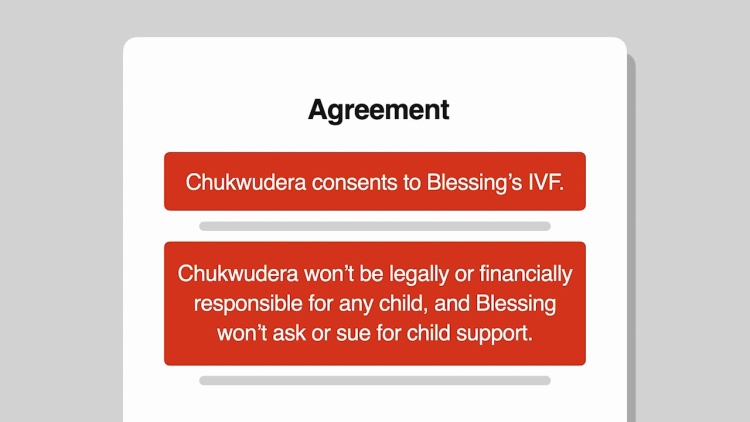Okoli v. Okoli
Massachusetts Appeals Court
963 N.E.2d 730 (2012)
- Written by Rose VanHofwegen, JD
Facts
Blessing Okoli (plaintiff) and Chukwudera Okoli (defendant) married and tried unsuccessfully to conceive. When they separated in 2000, they were on a waiting list for donor eggs and sperm for in vitro fertilization (IVF). When eggs became available in 2001, the couple signed an agreement providing that Chukwudera consented to his wife beginning IVF, and that he would recognize any resulting offspring “as previously and mutually agreed to by both parties.” However, the agreement claimed he would not be financially obligated for them, and that Blessing would not ask or sue for financial support. Chukwudera claimed that Blessing made him sign the agreement by threatening to withdraw her support of his citizenship application. Each time Blessing underwent IVF, Chukwudera signed a consent form, many times noting that he was signing it pursuant to the couple’s 2001 agreement. Finally, IVF resulted in the birth of twins in 2003. When the couple divorced in 2009, the judge ordered Chukwudera to pay child support. Chukwudera appealed, arguing that his conditional consent did not qualify to treat him as the child’s parent under Massachusetts law, and that Blessing obtained his consent through coercion and forged his signature.
Rule of Law
Issue
Holding and Reasoning (Mills, J.)
What to do next…
Here's why 907,000 law students have relied on our case briefs:
- Written by law professors and practitioners, not other law students. 47,100 briefs, keyed to 996 casebooks. Top-notch customer support.
- The right amount of information, includes the facts, issues, rule of law, holding and reasoning, and any concurrences and dissents.
- Access in your classes, works on your mobile and tablet. Massive library of related video lessons and high quality multiple-choice questions.
- Easy to use, uniform format for every case brief. Written in plain English, not in legalese. Our briefs summarize and simplify; they don’t just repeat the court’s language.





